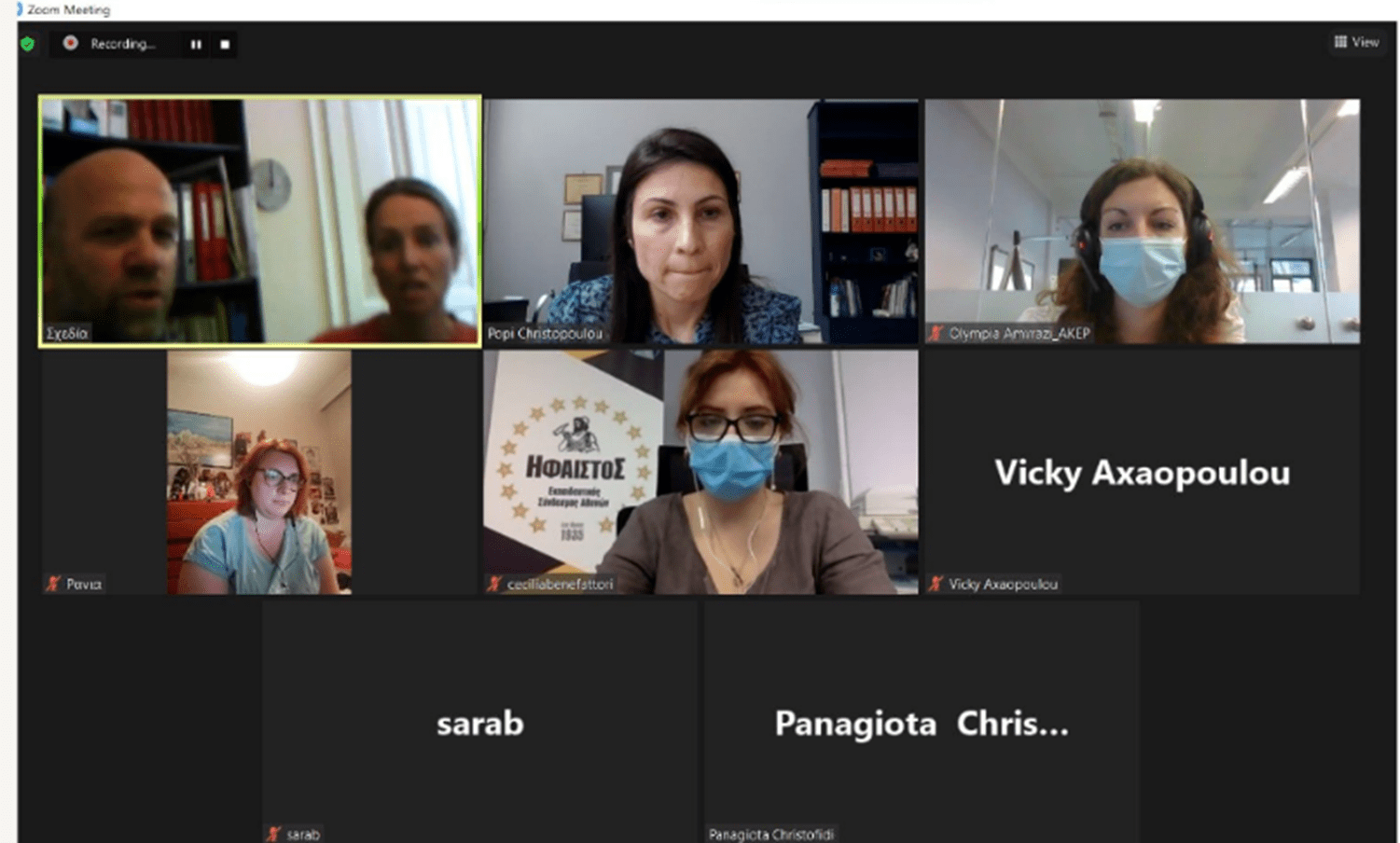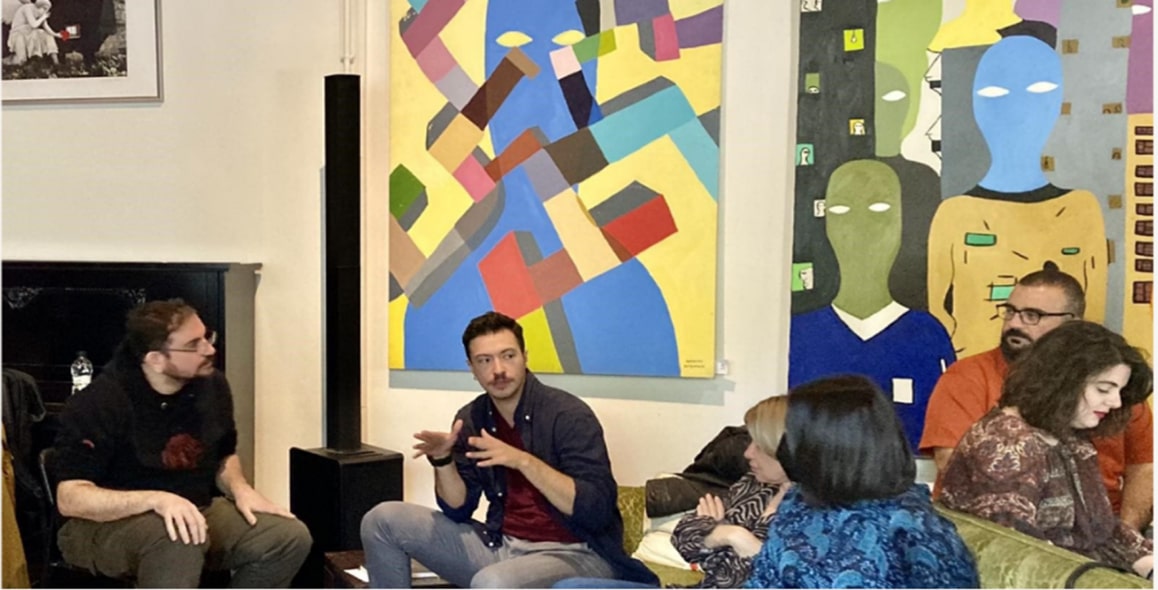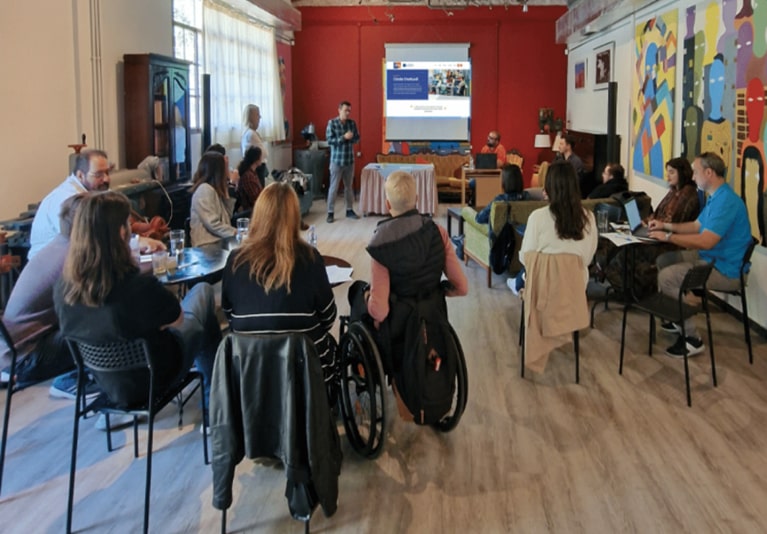We now present the meetings and workshops that provided the impetus behind the development of our Action Plan.
This online meeting was held on 24 May 2022 with 22 people in attendance representing
Hfaistos Educational Association


During the first Panel meeting, the project's background, goals, and the project's vision were presented, along with a broader perspective. Three keynote speakers shared their personal experiences to educate participants about the essence of Circular Creatives. They provided insights into what Circular Creatives entails through their own experiences.
A questionnaire was distributed among the participants to establish a starting point of understanding. The findings revealed that certain attendees lacked clarity about the concept of a circular economy, while others were already implementing commendable approaches in their professional and personal environments.
This in-person meeting was held on the 11th of November 2022 in Myrtillo Arts Center, a unique business idea that started up its operations in Athens, Greece, as a Social Cooperative Enterprise with a special purpose, of integrating vulnerable groups into the labor market.
People in attendance representing
The focus of Panel meeting 2, the aim was to explore the panel's collective comprehension of circular creatives on a more profound level.
Myrtillo Social Enterprise, introduced by visionary founder Georgia Vamvounaki Raffan, has emerged as a transformative hub for artistic exploration and social impact. Since its inception in October 2013, Myrtillo has evolved into an exemplary arts center, poised at the intersection of creativity and sustainable practices.
At Myrtillo, artistic expression flourishes in harmony with the principles of the circular economy. The center fosters a dynamic environment where discarded materials are reincarnated into vibrant art installations, breathing new life into forgotten resources. Through innovative workshops and collaborative projects, artists and creators engage in the upcycling process, embracing the ethos of reducing waste and maximizing resource utilization.
Functioning as an incubator for circular creativity, Myrtillo orchestrates exhibitions that challenge conventional perceptions of art while promoting eco-consciousness. From sculptures assembled from reclaimed materials to installations evoking mindfulness about consumption patterns, each creation resonates with the pulse of sustainability.
Yet, navigating the artistic landscape within a circular economy framework comes with its own set of challenges. Artists within this sector often grapple with reconciling their creative vision with the limitations of available materials. Sourcing reclaimed materials requires a keen eye and inventive spirit, as well as an ongoing dialogue with the local community to secure suitable resources.

Despite these challenges, Myrtillo stands as a beacon of inspiration, demonstrating that creativity can flourish within the boundaries of a circular economy. Its dedication to providing opportunities for vulnerable groups, such as individuals with disabilities, showcases the power of art to foster inclusivity and drive positive change.
Since its establishment, as said by its owner Vassiliki Hortiati, Vissino Artplace has become a vibrant epicenter where youthful artistic voices find resonance. With a pronounced dedication to sustainability, the art center has ingeniously integrated circular economy principles into its core ethos. Here, discarded materials find new life as artistic mediums, serving as a canvas for innovative expression.
By ingeniously fusing artistry with sustainability, Vissino Artplace sparks a dialogue that transcends traditional artistic paradigms. The center's workshops and collaborative ventures invigorate young arts graduates, encouraging them to explore uncharted creative territories while embracing the values of resource optimization and waste reduction.

A key topic that took center stage was the expansion of our panel's influence beyond the confines of Greece's craft sector, all while maintaining a strong connection to the principles of the circular economy. We delved into the exciting prospect of extending our discussions and collaborations to encompass a wider array of creative industries, each with its unique role to play in promoting sustainability.
The conversation ignited with a recognition of the interconnectedness of creative sectors. From design to digital media, each industry has the potential to contribute to the circular economy's goals.
By broadening our horizons, we open the door to cross-disciplinary collaborations that can result in innovative approaches to resource optimization and waste reduction.
One of the core ideas that emerged was the establishment of a platform that facilitates knowledge exchange and partnerships between artists, entrepreneurs, and professionals from various creative domains. By nurturing a collaborative ecosystem, we could foster the sharing of best practices, sustainable strategies, and inventive concepts that could reshape how different industries approach circularity.
The potential benefits of such an expansion are manifold. Not only would it amplify our impact, but it would also serve as an incubator for new ideas that might not have emerged within the confines of a single sector. By inviting diverse perspectives, we tap into a wellspring of creativity that can fuel the evolution of circular practices in unexpected and exciting ways.
However, we also acknowledged the challenges that come with this endeavor. Bridging gaps between different creative sectors requires effective communication and the cultivation of a shared understanding of circular economy principles. It necessitates the identification of common ground and the articulation of how each industry's unique strengths can contribute to a more sustainable future.
As we charted our path forward, it was clear that our panel's commitment to the circular economy remains unwavering. The prospect of forging connections, igniting new dialogues, and amplifying our collective impact across a spectrum of creative fields was met with enthusiasm. We left the meeting invigorated, ready to embark on a journey that expands the boundaries of circular creatives and fosters a thriving ecosystem of sustainability-driven collaboration.
Panelists that participated represented the following organisations:


